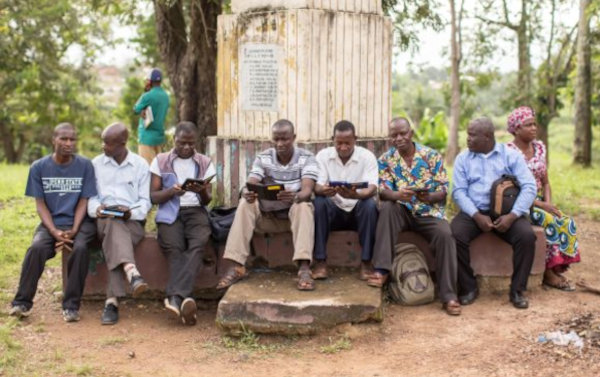Theological schools in Africa and the Philippines are providing e-libraries for their students.
NASHVILLE, Tenn., August 3, 2017 – The E-Reader Project is a joint program of the General Board of Higher Education and Ministry (GBHEM) and Discipleship Ministries (DM). The two agencies renewed their commitment to support this project during the 2017-2020 quadrennium with plans to expand this important initiative. As part of this process, DM, GBHEM, and the African Association of United Methodist Theological Institutions (AAUMTI) led a one-day e-reader training this summer in Liberia at the First United Methodist Church in downtown Monrovia. The training was led by Robin Pippin, director of Contextual Resource Development and Distribution, Discipleship Resources International (DRI) and Julu Swen, a Liberian-based United Methodist layman and writer, and DRI’s representative in West Africa.
Approximately 20 students and several faculty from the Graduate School of Theology, United Methodist University (UMU) in Monrovia, Liberia attended the e-reader training. The vice president for Academic Affairs at UMU, Dr. Albert D. Coleman, and vice president for Research at UMU Dr. George Weagba shared remarks of gratitude during the training.
Speaking on I Timothy 3:15, Isaac S. Dowah, a student at UMU, gave the devotion. Dowah used the metaphor of family for the church and a global village. He said one of the fruits of being in a big family with the U.S. church is that “the U.S. church is not just comfortable with the technology they have, but they want to share it with us. This is what is expected of family members.” He ended with, “May God build us into the family he wants us to be.”
Dr. Yatta Young, dean of the Graduate School of Theology at UMU and the first person to launch the E-Reader Project under AAUMTI in 2013, shared her experience with the project at the training. She highlighted the importance of books and partners who have helped provide theological texts to Liberia. The project launched with Operation Classroom in 2003, a program that brought books over by ship, and now the E-Reader Project, which provides new textbooks and books written by Africans. Through the E-Reader Project, students have access to an electronic library with hundreds of publications.
Young recognized the contributions of Brent Beazly, the donor for this project and retired engineer who she says understands the impact of technology on education in places like Liberia. “We are here because he decided to use his money to provide us with this opportunity,” said Young. She has been in touch with Beazly and plans to continue their communications.
Weagba said that “history is being made today,” and that he has been privileged to be a part of two history-making days, noting that he was also part of the pilot E-Reader Project at Gbarnga School of Theology in 2013. He shared that he was grateful to God that the two United Methodist agencies, GBHEM and DM, have joined efforts to help provide sorely lacking texts to Liberia.
After the training, Swen and Pippin spent some time with the new project manager and departmental assistant, Rev. Massa Mussah. They presented Mussah with a flash drive that included more than 20 new books from the Society for Promoting Christian Knowledge (SPCK), a publisher in the United Kingdom, that she was then able to add to the e-readers.
“The students were bright, excited and a bit older than the usual students this training is hosted for,” Pippin said. “As the students are completing a master’s program in theology, it sometimes takes them a long time to find the funds and time to attend a program like this, so many of them had already been in ministry for a while.
Pippin added, “We have a good champion and advocate for this program in Dr. Yatta Young. She inspired the whole group with her praise for reading and education.”
“The E-Reader Project is a wonderful partnership. It is a perfect complement to our ongoing work—promoting theological education in fast growing Central Conferences, expanding access to theological resources and enhancing the teaching/learning environment at each institution, no matter how remote they are,” said Rev. Dr. Kim Cape, general secretary at GBHEM.
AAUMTI, a GBHEM supported program, was established in 2001 to bring together all the United Methodist theological seminaries and promote cooperation among them. Today, AAUMTI includes 20 member institutions. These seminaries offer theological education to the new generation of United Methodist leaders.
To learn more about AAUMTI and the E-Reader Project, please visit GBHEM.org or umcereader.org.
Last Updated on November 2, 2023

